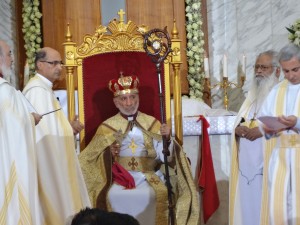New Patriarch of the Assyrian Church of the East, Mar Gewargis III
This is old news for some, but it bears sharing here because it opens up the valued question of communio. The Assyrian Church of the East, of the ancient Christian churches, has good news in their attempt to revision their ministry in the 21st century. Christine Chaillot wrote the following piece trying to explain the complexities of this particular church. Let us pray for the Christians in Iraq, Catholic and Orthodox as they make their way in the face of the Islamist regime. The communion of churches and how we witness to Christ in the error of war and ideology is going to make or break Christianity.
 On September 22, 2015, the journalist, John Burger [a New Haven, CT resident], entitled his article : «As Refugees Stream. Out of Middle East, One Exiled Church May Be Headed Back. Assyrian Church of the East elects a new leader, and they may be already building his home in war-weary Iraq.
On September 22, 2015, the journalist, John Burger [a New Haven, CT resident], entitled his article : «As Refugees Stream. Out of Middle East, One Exiled Church May Be Headed Back. Assyrian Church of the East elects a new leader, and they may be already building his home in war-weary Iraq.
The return of the Church of the East to Erbil to elect the new Catholicos-Patriarch is highly significant. In 1933 Mar Shimun XXIII Eshaia, the Catholicos-Patriarch of the Assyrian Church of the East was obliged to leave Iraq and went into exile in the USA where the see was established in Chicago. When his successor, Mar Dinkha IV, passed away on March 26 2015 after an incumbency of almost forty years, elections were organised and the Holy Synod chose Mar Gewargis III who was enthroned at St. John’s Cathedral in Erbil on Sunday, Sept. 27 2015. He had previously been Metropolitan of Iraq, Jordan and Russia. Born in Habbaniyah, Iraq and educated at the University of Baghdad, prior to his ordination as a deacon in 1980, Mar Giwargis taught English in several Iraqi schools. In 1981, he was elevated to Metropolitan of Baghdad and all Iraq. His long experience of life and politics in Iraq, with its accompanying political upheaval and displacement will be invaluable in steering the Church of the East.
The consecration of Catholicos-Patriarch Gewargis III was attended by an international array of bishops from the Church of the East, who travelled from the USA, Canada, Australia, Iran, Syria and Sweden (where the bishop is responsible for all Europe) and of course India where the Church of the East was the first Christian presence since the beginning of Christianity, in Kerala (south west India). Also present were representatives of several Churches from Iraq (among them the Chaldean Catholic Patriarch Mar Louis Sako and bishops, the Syrian Orthodox Patriarch Ephrem and bishops) and from abroad, including from the Vatican and from the World Council of Churches. Political personalities were also present, including a Chinese delegate, recalling the remarkable misssionary activity that the Church of the East conducted for almost a millennium across Iran, Afghanistan and Central Asia reaching Mongolia and China. Today, the Church of the East has a new internationalism, but is firmly rooted in Mesopotamia.
Christianity has been present in Iraq since apostolic times; its founders were St Thomas of the Twelve Disciples and Ss. Addai (Thaddaeus) and Mari of the Seventy Apostles. The first location of the see of the Church of the East was in Seleucia-Ctesiphon, then the Persian capital, near present Baghdad. In the 9th century the patriarchate moved to Baghdad and then through various cities in what is now northern Iraq and also northwest Iran. In September 2015 the see was transfered from Chicago to Erbil, the present capital of the Kurdistan Regional Government (KRG) administered region of northern Iraq, a move that returned to historic roots since Erbil, the capital of the kingdom of Adiabene, was a very early bishopric in the first centuries of the Christian era. Currently, a new patriarchal building (on a grand avenue and opposite a large, new mosque) is being built in Erbil, on land donated by the KRG authorities. At the time of the consecration of Mar Gewargis III, the construction had not yet been completed, but the extensive grounds should also accommodate auxiliary buildings, including a seminary and a print-shop.
As well as physical growth, there have been attempts to heal the schism between the Assyrian Church of the East and the Ancient Church of the East that erupted in the mid 1960’s. The patriarch of the Ancient Church of the East, Mar Addai, has resided in Bagdad since 1964. Talks prior to the patriarchal election aimed at reconciliation. Although the reunification of the two factions has not yet been realised, further negotiation to this end will continue in the future. The patriarchal election heralds a new era for the Church of the East and all Christians in Iraq and the Middle East. As hundreds of thousands of people stream from war-torn areas of the Near East and Africa into Europe and elsewhere —and Christian leaders are desperately trying to keep their flocks in their ancestral homelands— the return of the Church of the East to the KRG admininistered region of northern Iraq in order to have the see ‘back home’ and for the Catholicos-Patriarch to be close to his faithful and encourage them to stay in their traditional homeland is heroic and very Christian. The return of the Catholicos-Patriarch within their midst is celebrated with great joy by all the faithful of the Church of the East in Iraq and also by the diaspora communities.
